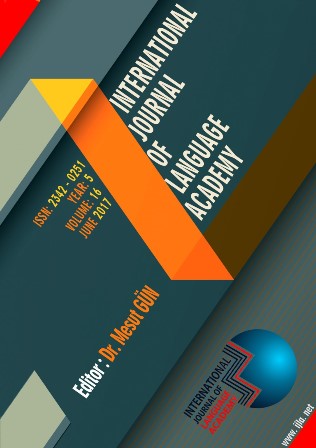Author :
Abstract
Sözlü dilde varlığını sürdüren ağızlara ait söz varlığı, gerek ağız derleme çalışmaları gerekse halk bilimi kaynakları gibi akademik çalışmaların yanı sıra bazı edebi metinlerde de karşımıza çıkmaktadır. Modern Türk edebiyatının önde gelen isimlerinden Hasan Ali Toptaş’ın son iki romanı olan Heba ve Kuşlar Yasına Gider adlı eserlerinde, Türkiye Türkçesi ağız verilerine özellikle de çocukluğunun geçtiği Denizli ili ağızlarında kullanılan ağız verilerine yer verdiği görülmektedir. Çalışmada, Denizli ile birlikte başka illerde de kullanılan yerel dile ait 95 sözlük birim belirlenmiştir. Tespit edilen bu sözlük birimler; Derleme Sözlüğü’nde Belirtilmiş Sözlük Birimler, Derleme Sözlüğü’nde Hiç Yer Almayan Sözlük Birimler ve Derleme Sözlüğü’nde Yalnızca Denizli’den Derlenen Sözlük Birimler şeklinde üç başlık altında incelenmiştir. Üslup çalışmalarında da kullanılan söz varlığına dair tespitlerde sözcüklerle eser arasında bağlantı kurulmaktadır. Kuşlar Yasına Gider romanının ağız verileriyle desteklenmiş olması ve bu verilerin çoğunlukla yazarın doğduğu Denizli iline ait olması eserin otobiyografik özellikte olmasını desteklemektedir. İki eser arasında karşılaştırma yaptığımızda özellikle Kuşlar Yasına Gider adlı romanda yöreye ait daha fazla söz tespit edilmiştir. Bu da eserin içeriği ile söz varlığı paralelliğini destekleyen önemli bir durumdur. Belirlenen yerel dile ait söz varlığının daha çok eylem adı, bitki adı, evin bölümleri ve yer adı, niteleme ve ev-bahçe ile ilgili araç ve gereç adıları olduğu ortaya çıkmıştır. Hasan Ali Toptaş’ın eserleri, sesbilgisi, biçimbilgisi ve söz dizimi bakımlarından da incelemeye değerdir. Ancak çalışmada bu konular hariç tutularak sadece söz varlığı tespitlerine yer verilmiştir. Üslup çalışmaları açısından üzerinde durulması gereken bu sözlük birimlerin çoğu Derleme Sözlüğü’nde belirlenmiştir.
Keywords
Abstract
The verbal existence of the accent that sustain the existence of the verbal language also take place in some literary texts besides academic works such as compiling studies, verbal compilation studies, and folklore resources. It is observed that Turkey Turkish has a place in verbal accent, especially in the accent of Denizli, where childhood passes in his works titled Heba and Birds Yasına Gider in last two novels of Hasan Ali Toptaş who one of the leading names of modern Turkish literatüre. In the study, 95 lexeme belonging to the local language used in other provinces along with Denizli were identified. These lexemes were examined in units of three headings: Lexemes Specified in the Collation Dictionary, Lexemes which have no place in the Collation Dictionary and Lexemes compiled from only Denizli in the Collation Dictionary. The connection between the words and the works is established in the determinations about vocabulary which is also used in the style studies. It is the autobiographical feature of the work. The fact that the Kuşlar Yasına Gider novel is supported by the accent elements and these elements mostly belong to the Denizli province where the author was born supports the autobiographical character of the work. When we compare the two works, especially in the novel named Kuşlar Yasına Gider more words belonging to the locality have been found. This is also an important condition that supports the parallels of the vocabulary with the contents of the work. The vocabulary belonging to the determined local language is mostly the name of the action, the name of the plant, the parts of the house and attribution, the name of the instrument and the tools related to the home and garden. Hasan Ali Toptaş's works are also worth examining in terms of phonetics, morphology and syntax. However except for these subjects, only vocabulary determinations were included in the study. Most of these lexemes which should be emphasized in terms of style studies have been determined in the Compilation Dictionary.
Keywords
- Aksoy, Ö. A. (2016). Atasözleri ve Deyimler Sözlüğü I-II. İstanbul: İnkılâp Kitabevi.
- Baytop, T. (2007). Türkçe Bitki Adları Sözlüğü. Ankara: Türk Dil Kurumu Yayınları.
- Demir, N. (2009). “Edebi Metinlerde Ağız Kullanımı Hakkında Bir Ön Çalışma”. Turcological Letters to Bernt Brendemoen. Edited by Éva Á. Csató vd. (The Institute fo Comparative Research in Human Culture.). Oslo: Novus forlag. ss.97-108.
- Derleme Sözlüğü I-XII.(1963-1982). Ankara: Türk Dil Kurumu Yayınları.
- Eren, H. (1999). Türk Dilinin Etimolojik Sözlüğü. Ankara: Bizim Büro Basımevi.
- Eren, M. E. (1997). Zonguldak, Bartın, Karabük illeri ağızları. Ankara: Türk Dil Kurumu Yayınları.
- Gemalmaz, E. (1995). Erzurum ili ağızları (İnceleme-Metinler-Sözlük ve Dizinler). Ankara: Türk Dil Kurumu Yayınları.
- Günşen, A. (2000). Kırşehir ve Yöresi Ağızları, İnceleme-Metinler-Sözlük. Ankara: Türk Dil Kurumu Yayınları.
- Karakurt, E. (2013). “Doğal Olarak Yetişen Kuş Fiği (Vicia cracca L.)’nin Bazı Bitkisel Özelliklerinin Belirlenmesi”. Tarla Bitkileri Merkez Araştırma Enstitüsü Dergisi, S. 22 (1): 26-31.
- Kurt, T. (2011). “Şair değilim”. Başlarken yalnızsın, bittiğinde daha da yalnız. İletişim Yayınları. ss. 267-269).
- Öztunç, M. (2013). “Harflere sadece ses olarak bakmam; onlar birer canlıdır gözümde”. Başlarken Yalnızsın, Bittiğinde Daha da Yalnız. İletişim Yayınları. ss. 77-81.
- Uygur, C. V. (2007). Denizli İli Ağızları. Denizli Belediyesi Kültür Yayınları: 4.
- Tarama Sözlüğü (2009). 4. Baskı. c. 1. Ankara: Türk Dil Kurumu Yayınları.
- Toptaş, H. A. (2014). Heba. İstanbul: İletişim Yayınları.
- Toptaş, H. A. (2014). Başlarken yalnızsın, bittiğinde daha da yalnız. (editör: Levent Cantek). İletişim Yayınları.
- Toptaş, H. A. (2016). Kuşlar Yasına Gider. İstanbul: Everest Yayınları.
- Turan, Z. (2006). Artvin İli Yusufeli İlçesi Uşhum Köyü Ağzı. Ankara: Türk Dil Kurumu
- Türkçe Sözlük (2011). Ankara: Türk Dil Kurumu Yayınları.
- Varlık, M. (2013). “Kelimeleri havalandırmak”. Başlarken Yalnızsın, Bittiğinde Daha da Yalnız. İletişim Yayınları. ss. 131-138.
- Yüzbaşıoğlu, N. (2010). Hasan Ali Toptaş’ın Romanlarının Stilistik İncelenmesi, Yüksek Lisans Tezi. Celal Bayar Üniversitesi Sosyal Bilimler Enstitüsü. Manisa.
